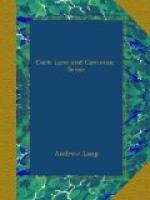We next have a Mahatma-like tale about Cotton Mather, from Mr. Stirling, who had it from a person who had it from the doctor’s own mouth. Briefly, Cotton lost his sermon as he was riding to a place where he had to preach. He prayed for better luck, and ’no sooner was his prayer over, but his papers wer conveyed to him, flying in the air upon him when riding, which was very surprizing’. It was, indeed! Wodrow adds: ‘Mind to write to the doctor about this’. This letter, if he ever wrote it, is not in the three portly volumes of his correspondence.
The occurrence is more remarkable than the mysterious dispensation which enabled another minister to compose a sermon in his sleep. Mr. James Guthrie, at Stirling, ’had his house haunted by the devil, which was a great exercise to worthy Mr. Guthrie,’ and, indeed, would have been a great exercise to almost any gentleman. Details are wanting, and as Mr. Guthrie had now been hanged for sixty years (1723), the facts are ‘remote’. Mr. Guthrie, it seems, was unpopular at Stirling, and was once mobbed there. The devil may have been his political opponent in disguise. Mr. John Anderson is responsible for the story of a great light seen, and a melodious sound heard over the house of ’a most singular Christian of the old sort,’ at the moment of her death. Her name, unluckily, is uncertain.
A case of ‘telepathy’ we have, at first hand, from Mrs. Luke. When in bed ‘a horror of darknes’ came upon her about her daughter Martha, who was in Edinburgh. ’Sometimes she began to think that her daughter was dead, or had run away with some person.’ She remained in this anxiety till six in the morning, when the cloud lifted. It turned out that Martha had been in some peril at sea, but got safe into Leith Roads at six in the morning. A clairvoyant dream was also vouchsafed to Dr. Pitcairn, though ’a Jacobite, and a person of considerable sense,’ as Wodrow quaintly remarks about another individual.
The doctor was at Paris when a friend of his, ‘David’ (surname unknown), died in Edinburgh. The doctor dreamed for several nights running that David came to him, and that they tried to enter several taverns, which were shut. David then went away in a ship. As the doctor was in the habit of frequenting taverns with David, the dreams do not appear to deserve our serious consideration. To be sure David ‘said he was dead’. ’Strange vouchsafments of Providence to a person of the doctor’s temper and sense,’ moralises Wodrow.




